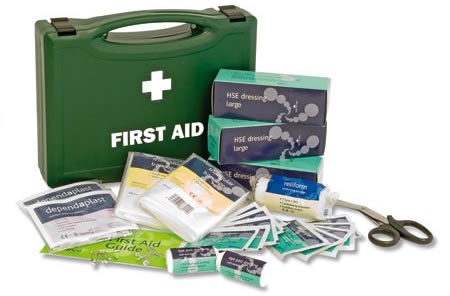Wounds can be very painful. While skin deep wounds are not something to worry about overmuch, though they too cannot be left unattended, deep cuts or punctures beg immediate medical attention. The damage to the dermis of the skin is to be attended to without delay in order not to allow further complications. First aid is the best aid in these cases whether the patient requires admission into hospital or not in the later stage. A first aid kit should always be at hand to meet the contingencies.
Keep it Handy
A standard first aid kit will contain adhesive tapes, scissors and tweezers, ice picks, gauze, alcohol wipes, antibiotic ointments etc.. You might decide to assemble a kit on your own, but it is a burdensome procedure. Packing it neatly in the proper order may not come out satisfactory. The smart thing to do is to buy off the kit put together by a reputed manufacturer/supplier. Make sure that it fulfills the requirements as stipulated by OSHA or ANSI. It may sound odd to you that we should recommend that you keep one handy in all the places you frequent; your house, car, office and during travel, in your bag but it makes sense if you thought about it.
What it Should Contain
Most first aid kits contain wound measurement kits, applicators, bandages of various kinds, wound care tapes, swab sticks, preps and swabs, ointments, gauze pads, pressure relief, dressing trays and kits, liquid adhesive, dressing etc.
Advanced kit
You may go for a more comprehensive kit that could administer to bruises or sprains at one level but can also bring black-out relief into its ambit in which case, it should contain CPR shields and AED. There are some packages that include trauma kits, fanny packs, disaster kits, waterproof or harsh environment kits and kits that can stop severe bleedings in most cases. Look carefully for the products that meet OSHA and ANSI Z308.1-2009 standard. When you find yourself in a situation where you need to clean and dispose body fluids like vomit, blood or urine, you must have blood borne pathogen supplies like biohazard bags, fluid control solidifiers and clean up kits.
Pain Killers
Medicines are an essential part of first aid kits too. Tincture iodine and similar products help heal the wound. The pain, however, can only be managed by pain relievers like aspirin, acetaminophen (Tylenol), naproxen (Aleve), ibuprofen, nonsteroidal anti-inflammatory drugs (NSAIDs). Keep them ready at hand. It is important that they are replaced by a new batch of medicines when they expire. Make a note of the date of expiry and of keep abreast of it.
Train Yourself
First aid courses are conducted by many government and private agencies. It is worth one’s while to learn the correct procedures and practice them if possible. And, instead of relying solely on the course you had completed, you must keep learning new procedures as they are developed. Medical field is seeing immense advances. First aid has gained in stature and has all the potential to become a mainstream medical procedure.

